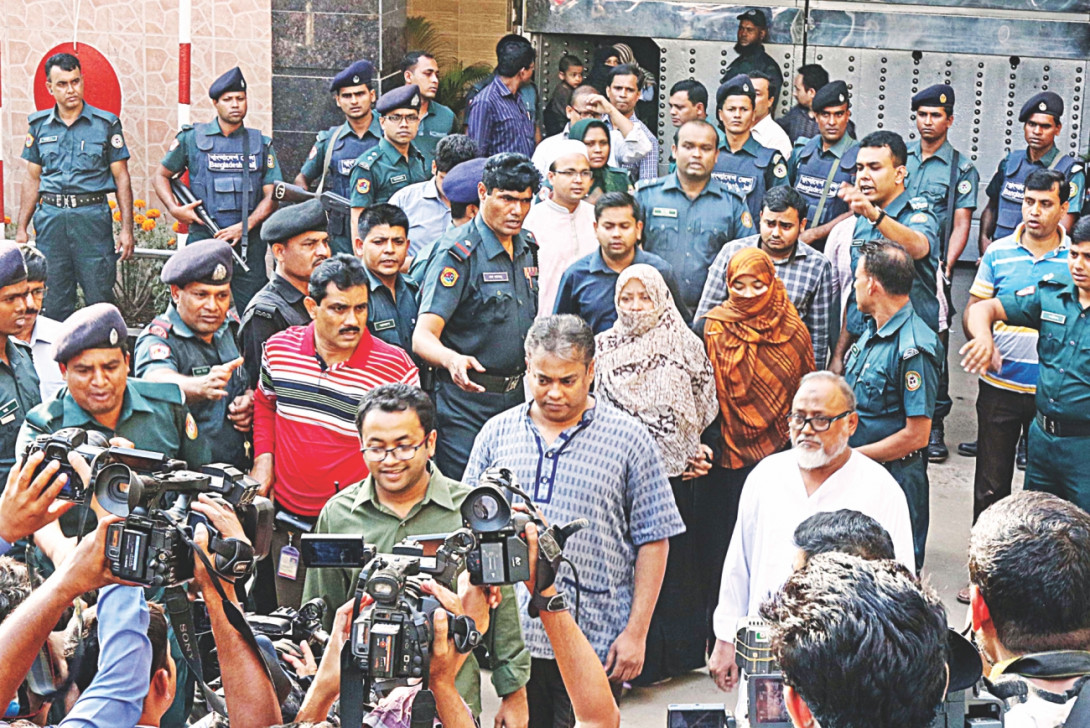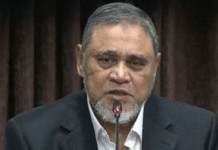The jail authorities last night received the copies of the Supreme Court judgments that upheld the death penalty of Salauddin Quader Chowdhury and Ali Ahsan Mohammad Mojaheed for war crimes.
The decision to implement the verdicts is now up to the prison authorities.
Jahangir Kabir, senior superintendent of Dhaka Central Jail, received the copies from acting deputy registrar of the International Crimes Tribunal Md Aftabuzzaman around 8:50pm.
Sources in the Special Branch of police said the jail authorities read out the SC verdicts to the war crimes convicts around 10:00pm.
Earlier in the day, the SC released its full verdicts that dismissed the petitions of Jamaat leader Mojaheed and BNP leader Salauddin to review their death sentence originally handed down by two tribunals in 2013.
“We have sent the copies of the two verdicts to the jail authorities and the district magistrate in Dhaka at 8:35pm,” Shahidul Alam Jhinuk, registrar of the International Crimes Tribunal, told The Daily Star.
Both the convicts are in Dhaka Central Jail, where journalists and onlookers had been crowding since morning.
In line with the precedence in previous executions of war crimes convicts, an executive magistrate is to ask them if they would seek presidential clemency within a “reasonable time”.
“The date and time of their execution will depend on their decision about the mercy petition,” Law Minister Anisul Huq told reporters.
The apex court dismissed their review petitions on Wednesday, paving the way for the government to execute Mojaheed, general secretary of the Jamaat-e-Islami, and Salauddin, a member of the BNP standing committee.
Yesterday, family members of both the convicts met them at the prison.
Twenty two family members of Salauddin went to the Dhaka Central Jail in Old Dhaka around 12:30pm. The jail authorities, however, allowed 15, including Salauddin’s wife Farhad Quader Chowdhury, sons Fazlul Quader and Hummam Quader, daughter Farzin Quader and sisters Jubaida Monwar and Hasina Quader.
After about an hour’s meeting, they came out of the jail but refused to talk to the media.
Twelve family members of Mojaheed went inside the jail around 1:50pm and remained there for about 30 minutes. Mojaheed’s family members included his wife Tamanna-E-Jahan and son Ali Ahmed Mabrur.
After the visit, Mabrur said his father did not say anything about seeking presidential mercy. His father, however, believes that the president is the constitutional guardian of the country and he, upon consultation with his lawyers, will send “an application to the president on a special issue,” Mabrur said.
Mabrur said his father did not say what he meant by “special issue”.
Meanwhile, five lawyers for Mojaheed yesterday sought permission from the jail authorities to meet their client in prison today.
Gazi MH Tamim, one of the counsels, told The Daily Star that they filed the application at 5:30pm. “We are yet to get a response as of 10:00pm [yesterday].”
He added that Mojaheed expressed his desire to meet his lawyers before making his decision on seeking presidential mercy. “That’s why we sought the permission to meet him.”
Mojaheed, who was the chief of infamous Al-Badr Bahini in 1971, was handed down death penalty in July 2013 for planning and instigating the killing of intellectuals and professionals at the fag end of the Liberation War.
He was given life sentence on two other charges, and five years’ imprisonment on one.
Salauddin, a self-proclaimed brigadier in 1971, was sentenced to death in October that year for committing crimes against humanity and acts of genocide in Chittagong in 1971.
He was given the death penalty on four charges — the killing of philanthropist Natun Chandra Sinha, murders of Awami League leader Mozaffar Ahmed and his son, and two acts of genocide in Sultanpur Banikpara and Unasattarpara in Raozan of Chittagong.
The BNP leader was given 20 years in jail each on two charges and five years’ imprisonment each on two other charges.













